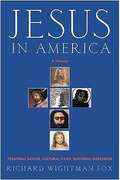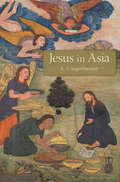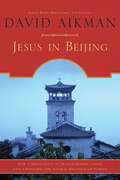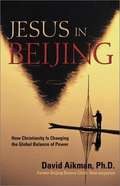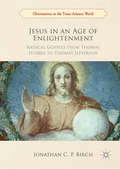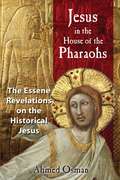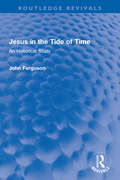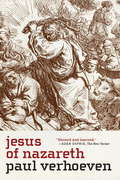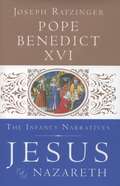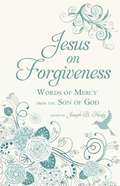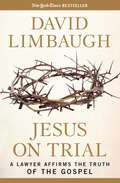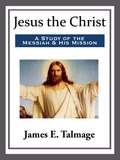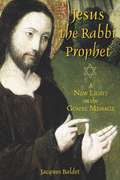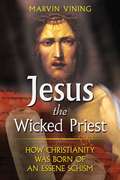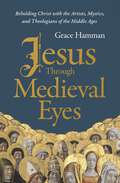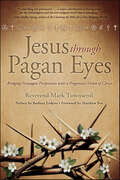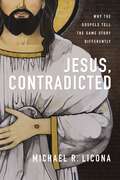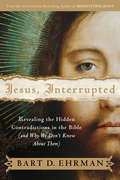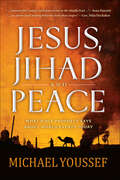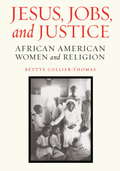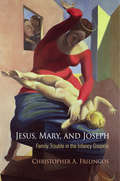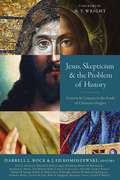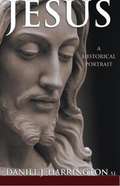- Table View
- List View
Jesus in America: Personal Savior, Cultural Hero, National Obsession
by Richard Wightman FoxWhere else but America do people ask: What Would Jesus Do? What Would Jesus Drive? What Would Jesus Eat? "This book is for believers and non-believers alike. It is not a book about whether one should believe in Jesus, but about how Americans have believed in and portrayed him." -- from the Introduction Jesus in America is a comprehensive exploration of the vital role that the figure of Jesus has played throughout American history. Written by one of our most distinguished historians, Richard Wightman Fox, this book provides a brilliant cultural history of Jesus in America from its origins to today, demonstrating how Jesus is the most influential symbolic figure in our history. Fox shows how Jesus influenced such major turning points in American history as: Columbus's voyage of discovery The arrival of the English puritans and Spanish missionaries The American Revolution The abolition of slavery and the Civil War Labor movements Social and cultural revolutions of the sixties and beyond The swelling tide of Christian voices in the politics and entertainment of today. Fox gives an expert, lively account of all the ways that Jesus is portrayed and understood in American culture.
Jesus in Asia
by R. S. SugirtharajahReconstructions of Jesus occurred in Asia long before the Western search for the historical Jesus began in earnest. Asians remade Jesus at times appreciatively and at other times critically. R. S. Sugirtharajah situates the historical Jesus beyond the narrow confines of the West and offers an eye-opening chapter in the story of global Christianity.
Jesus in Beijing: How Christianity Is Transforming China And Changing the Global Balance of Power
by David AikmanPolitics are being transformed by religion, namely in China-within the next thirty years, one-third of this potential superpower could be Christian.If this religious transformation occurs, China would be one of the largest Christian nations in the world. <P><P>David Aikman, former Beijing bureau chief for Time, unveils this spiritual revolution, detailing the impending political-religious conversion of the People's Republic of China and potential overthrow of its Communist Party through Jesus in Beijing: How Christianity is Transforming and Changing the Global Balance of Power.e way a reader views the world. Jesus in Beijing is one of those books.
Jesus in Beijing: How Christianity Is Transforming China and Changing the Global Balance of Power
by David AikmanWritten by a former correspondent for Time Magazine based in China, this book details the history of Christianity in China and relates the unreported story of the explosive growth among Chinese house churches. Through detailed interviews, the author presents several biographical sketches of Christians in China, providing a cross section from party officials to pastors and peasants. The book discusses how they network, how they worship, their influence on Chinese society, and what this change means to the global balance of power. It also discusses how party leaders and academics are responding to the rapid growth of Christianity.
Jesus in an Age of Enlightenment: Radical Gospels from Thomas Hobbes to Thomas Jefferson (Christianities in the Trans-Atlantic World)
by Jonathan C. BirchThis book explores the religious concerns of Enlightenment thinkers from Thomas Hobbes to Thomas Jefferson. Using an innovative method, the study illuminates the intellectual history of the age through interpretations of Jesus between c.1750 and c.1826. The book demonstrates the persistence of theology in modern philosophy and the projects of social reform and amelioration associated with the Enlightenment. At the core of many of these projects was a robust moral-theological realism, sometimes manifest in a natural law ethic, but always associated with Jesus and a commitment to the sovereign goodness of God. This ethical orientation in Enlightenment discourse is found in a range of different metaphysical and political identities (dualist and monist; progressive and radical) which intersect with earlier ‘heretical’ tendencies in Christian thought (Arianism, Pelagianism, and Marcionism). This intellectual matrix helped to produce the discourses of irenic toleration which are a legacy of the Enlightenment at its best.
Jesus in the Feasts of Israel: Restoring the Spiritual Realities of the Feasts to the Church
by Richard Booker[THIS SYNOPSIS IS QUOTED FROM THE BOOK.] "Through God's carefully ordered system of ceremonial worship. He revealed Himself most clearly to the nation of Israel. This is especially evident in the seven 'feasts of the Lord' as detailed in Leviticus 23: Passover, Unleavened Bread, First Fruits, Pentecost, Trumpets, Atonement, and Tabernacles." Jesus in the Feasts of Israel: Restoring the Spiritual Realities of the Feasts to the Church . . . "is a study of the Old Testament feasts showing how they pointed to Jesus and their personal and prophetic significance for today's world. The book points out how the Feasts represent seven steps to Christian growth and the peace, power and rest of God."
Jesus in the House of the Pharaohs: The Essene Revelations on the Historical Jesus
by Ahmed OsmanA provocative thesis that the historical Jesus was connected to the royal 18th dynasty of Egypt• Contends that Jesus, Joshua, and Tutankhamun were the same person• Provides evidence from church documentation, the Koran, the Talmud, and archaeology that the Messiah came more than a millennium before the first century C.E.• Shows that Christianity evolved from Essene teachings Although it is commonly believed that Jesus lived during the first century C.E., there is no concrete evidence to support this fact from the Roman and Jewish historians who would have been his contemporaries. The Gospel writers themselves were of a later generation, and many accounts recorded in the Old Testament and Talmudic commentary refer to the coming of the Messiah as an event that had already occurred.Using the evidence available from archaeology, the Dead Sea Scrolls, the Koran, the Talmud, and biblical sources, Ahmed Osman provides a compelling case that both Jesus and Joshua were one and the same--a belief echoed by the early Church Fathers--and that this person was likewise the pharaoh Tutankhamun, who ruled Egypt between 1361 and 1352 B.C.E. and was regarded as the spiritual son of God. Osman contends that the Essene Christians--who followed Jesus’ teachings in secret after his murder--only came into the open following the execution of their prophet John the Baptist by Herod, many centuries later. Yet it was also the Essenes who, following the death of Tutankhamun and his father Akhenaten (Moses), secretly kept the monotheistic religion of Egypt alive. The Essenes believed themselves to be the people of the New Covenant established between their Lord and themselves by the Teacher of Righteousness, who was murdered by a wicked priest. The Dead Sea Scrolls support Osman’s contention that this Teacher of Righteousness was in fact Jesus.
Jesus in the Tide of Time: An Historical Study (Routledge Revivals)
by John FergusonFirst published in 1990, Jesus in the Tide of Time considers the historical Jesus and studies the ways in which he has subsequently been regarded by different people in different cultures. The book examines the political, social, economic and religious background to Jesus’ life. It also looks at what is known about Jesus as a historical personality, and considers the use of symbolic figures by the early Christians to represent him. It highlights the attitude towards the person of Jesus as an indicator of the culture of the particular period and place throughout history, and questions whether different cultures, periods and individuals manufacture Jesus in their own image. Jesus in the Tide of Time will appeal to those with an interest in the history of Christianity, religious history, and social history.
Jesus of Nazareth
by Susan Massotty Paul Verhoeven Rob Van ScheersBuilding on the work of biblical scholars--Rudolph Bultmann, Raymond Brown, Jane Schaberg, and Robert Funk, among others--filmmaker Paul Verhoeven disrobes the mythical Jesus to reveal a man who has much in common with other great political leaders throughout history--human beings who believed that change was coming in their lifetimes. Gone is the Jesus of the miracles, gone the son of God, gone the weaver of arcane parables whose meanings are obscure. In their place Verhoeven gives us his vision of Jesus as a complete man, someone who was changed by events, the leader of a political movement, and, perhaps most importantly, someone who, in his speeches and sayings, introduced a new ethic in which the embrace of human contradictions transcends the mechanics of value and worth that had defined the material world before Jesus. "The Romans saw [Jesus] as an insurrectionist, what today is often called a terrorist. It is very likely there were 'wanted' posters of him on the gates of Jerusalem. He was dangerous because he was proclaiming the Kingdom of Heaven, but this wasn't the Kingdom of Heaven as we think of it now, some spectral thing in the future, up in the sky. For Jesus, the Kingdom of Heaven was a very tangible thing. Something that was already present on Earth, in the same way that Che Guevara proclaimed Marxism as the advent of world change. If you were totalitarian rulers, running an occupation like the Romans, this was troubling talk, and that was why Jesus was killed." --Paul Verhoeven, from profile by Mark Jacobson in New York Magazine
Jesus of Nazareth: The Infancy Narratives
by Pope Benedict Xvi Joseph RatzingerThis momentous third and final volume in the Pope's international bestselling Jesus of Nazareth series details how the stories of Jesus' infancy and childhood are as relevant today as they were two thousand years ago. In 2007, Joseph Ratzinger published his first book as Pope Benedict XVI in order "to make known the figure and message of Jesus. " Now, the Pope focuses exclusively on the Gospel accounts of Jesus' life as a child. The root of these stories is the experience of hope found in the birth of Jesus and the affirmations of surrender and service embodied in his parents, Joseph and Mary. This is a story of longing and seeking, as demonstrated by the Magi searching for the redemption offered by the birth of a new king. It is a story of sacrifice and trusting completely in the wisdom of God as seen in the faith of Simeon, the just and devout man of Jerusalem, when he is in the presence of the Christ child. Ultimately, Jesus' life and message is a story for today, one that speaks to the restlessness of the human heart searching for the sole truth which alone leads to profound joy.
Jesus on Forgiveness: Words of Mercy from the Son of God
by Joseph B. HealyThe act of forgiveness is not something that comes easily to most of us. Too often we become angry or judgmental instead of forgiving others. It can be difficult to remember we have all made mistakes or done things we regret, and we would want to be forgiven in turn. Alexander Pope famously wrote, "To err is human; to forgive, divine. ” It is that divinity that Jesus Christ embodies and to which so many aspire. Jesus’s message is one of forgiving anyone, and he lived by that same principle, providing an example to all. Jesus on Forgiveness contains quotes and wisdom from the teachings and ministrations of Jesus Christ as he communed with the people around him, stressing the need for sincere graciousness and letting go of the desire for revenge. His gentle words encouraging a spirit of forgiveness toward even those who have done us the most harm can inspire and touch people of any faith, Christian or otherwise. "Then Peter came to Jesus and asked, 'Lord, how many times shall I forgive my brother or sister who sins against me? Up to seven times?’ Jesus answered, 'I tell you, not seven times, but seventy-seven times. ’” (Matthew 18:21-22)
Jesus on Trial: A Lawyer Affirms the Truth of the Gospel
by David LimbaughNew York Times Bestseller!In Jesus on Trial, New York Times bestselling author David Limbaugh applies his lifetime of legal experience to a unique new undertaking: making a case for the gospels as hard evidence of the life and work of Jesus Christ. Limbaugh, a practicing attorney and former professor of law, approaches the canonical gospels with the same level of scrutiny he would apply to any legal document and asks all the necessary questions about the story of Jesus told through Matthew, Mark, Luke, and John. His analysis of the texts becomes profoundly personal as he reflects on his own spiritual and intellectual odyssey from determined skeptic to devout Christian. Ultimately, Limbaugh concludes that the words Christians have treasured for centuries stand up to his exhaustive inquiry-including his examination of historical and religious evidence beyond the gospels-and thereby affirms Christian faith, spirituality, and tradition.
Jesus the Christ
by James E. TalmageA rich and insightful overview of the Christian belief in Jesus, his life, his teaching and the meaning of Jesus today.
Jesus the Rabbi Prophet: A New Light on the Gospel Message
by Jacques BaldetRestores the historical context of the gospels and the Jewish nature of the message of Christ• Uses the latest historical findings to explore the life of Jesus in its true historical setting• Shows that Jesus was a Jewish teacher who sought to restore dignity to the ostracized members of his societyThe canonical gospels were in large part written by authors who were not eyewitnesses to the events they described, and their writings were slanted to fill the needs of the new Church. As a result, a huge gulf exists between the Christ of the Christian church and the historical Jesus. In Jesus the Rabbi Prophet scholar and historian Jacques Baldet seeks to restore the historical context and true nature of the Jewish society in which Jesus lived, and through which his actions assume on an entirely different meaning.The research of modern historians has shed much new light on the historical circumstances at work in Judaea and the Roman provinces that Jesus knew. Looking at the life of Jesus in its broader historical setting has given Jacques Baldet answers to many of the questions that have puzzled historians, such as when did Jesus really live and what was the true nature of his family, convictions, and spiritual beliefs. From this vibrant and highly informed perspective the deeper story of the man from Galilee emerges: Rabbi Jesus was both a Jew imbued with the monotheistic teaching of the Torah and a visionary who preached of the kingdom within. Viewed in their proper historical context, the Stations of the Passion and Christ’s betrayal by Judas and death on Calvary take on a new light. Baldet shows that the true life and original message of Jesus were concealed beneath the literary creations that primarily reflected the agenda of the early Church. Jesus was not trying to start a new religion. He was a Jewish teacher who sought to reform the faith of his fathers by restoring dignity to the unfortunate and ostracized members of his society.
Jesus the Wicked Priest: How Christianity Was Born of an Essene Schism
by Marvin ViningDecodes the Dead Sea Scrolls to reveal Christianity’s hidden Essene origins • Reveals the Essenes as key figures behind Jesus’s trial, torture, and crucifixion • Shows how Jesus, a former Essene himself, was deemed “the Wicked Priest” for his liberationist politics and humanist bent • Examines the lost Christian doctrine of reincarnation and the secret role of Gabriel in the Virgin Birth The Dead Sea Scrolls, discovered in 1947 at Qumran, are generally believed to have been written by a Jewish sect known as the Essenes between 350 BCE and 70 CE--but until now no convincing methodology has linked the Scrolls to the actual life and teachings of Jesus. Marvin Vining builds from the controversial work of Barbara Thiering to demonstrate that the Scrolls do speak directly to the origins of Christianity and even reflect a mirror image of the Gospels from the perspective of Jesus’s enemies.Christianity arose out of a schism between the exclusivist, rigid, and militant views of the Essenes and the inclusivist, tolerant, and nonviolent views of Jesus. Jesus was raised an Essene, but he refused to follow their orthodoxy. Vining shows that the Dead Sea Scrolls are written in a secret coded language called pesher in which Jesus emerges as the Wicked Priest, the antagonist to the Teacher of Righteousness who was the leader of the Essenes. Jesus the Wicked Priest revitalizes the Gospel message by revealing Jesus’s true role as a tireless social reformer and revolutionary teacher. Vining’s study reopens Christian doctrinal questions supposedly long settled, such as reincarnation and the Virgin birth--even demonstrating that these two issues are related. He discloses that the angel Gabriel was incarnate in a living human being and transmitted the seed of a holy bloodline to the Virgin Mary.
Jesus through Medieval Eyes: Beholding Christ with the Artists, Mystics, and Theologians of the Middle Ages
by Grace HammanC.S. Lewis noted that the church has a problem: Whenever Christians are brainstorming together about who Jesus is and who we are, we go out and read mostly people who agree with us, or who live in our same time and place. It's hard to separate the cultural wheat from the chaff. But what happens when we do read people's answers to Jesus's question from the past lives and places of the church--people who may be wholly unlike us? Who is Jesus? What is he like? And who am I, encountering Jesus?The answers will surprise you.Jesus through Medieval Eyes, by Grace Hamman, looks to the Christians of the Middle Ages, to a time and culture dissimilar to our own, for their answers to these questions. Medieval Europeans were also suffering through pandemics, dealing with political and ecclesial corruption and instability, and reckoning with gender, money, and power. Yet their concerns and imaginations are unlike ours. Their ideas, narratives, and art about Jesus open up paradoxically fresh and ancient ways to approach and adore Christ--and reveal where our own cultural ideals about the Messiah fall short.In thoughtful and accessible chapters, medievalist scholar Grace Hamman explores and meditates upon medieval representations of Jesus in theology and literature. These representations of Jesus span from the familiar, like Jesus as the Judge at the End of Days, or Jesus as the Lover of the Song of Songs, to the more unusual, like Jesus as Our Mother. Through the words of medieval people like Julian of Norwich, St. Bernard of Clairvaux, Margery Kempe, and St. Thomas Aquinas, we meet these faces of Jesus and find renewed ways to love the Savior, in the words of St. Augustine, that "beauty so ancient and so new."
Jesus through Pagan Eyes: Bridging Neopagan Perspectives with a Progressive Vision of Christ
by Mark TownsendFor Pagans and Christians alike, Jesus Through Pagan Eyes offers a provocative portrait ofJesus—as a compassionate, life-affirming, nature-inspired spiritual teacher, freed from the limiting ideology of the Church. Rev. Mark Townsend sets the stage by exploring the historical evidence of who Jesus was as a human being before delving into the realm of metaphor and mythology, the notion of Christ, and the Church's conception of Jesus as Christ.The heart of this unique book lies in the thoughtful and deeply moving collection of stories, essays, and interviews about Jesus from today's most respected Pagan, Wiccan, and Druidic leaders. Contributors such as Maxine Sanders, Christopher Penczak, Janet Farrar, Diana Paxson, Philip Carr-Gomm, Oberon Zell-Ravenheart, John Michael Greer, Selena Fox, and Raven Grimassi explore the historical figure of Jesus in relation to Witchcraft, the tarot, goddess worship, and shamanism—while illustrating how this god of the Christian church blesses and inspires those who embrace non-traditional spiritual paths.Whether you envision Jesus as an ascended master, a human teacher, or a mythic god-man, this remarkable book will introduce you to a Jesus who fits fully into the Pagan imagination.Praise:"Townsend uses Jesus to initiate dialogue, and he does so in way that is accepting and inclusive of many understandings and interpretations of Jesus, his purpose, and his relevance (or irrelevance) in the religious practices of contemporary Pagans."—Huffington Post"This work admirably promotes understanding between belief systems that have a sometimes uneasy relationship."—Publishers Weekly
Jesus, Contradicted: Why the Gospels Tell the Same Story Differently
by Michael R. LiconaThe differences and discrepancies in the Gospels constitute the foremost objections to their reliability and the credibility of their message. Some have tried to resolve Gospels contradictions with strained harmonization efforts. Many others conclude that the Gospels are hopelessly contradictory and, therefore, historically unreliable accounts of Jesus.In Jesus, Contradicted, New Testament scholar Michael Licona shows how the genre of ancient biography, to which the Gospels belong, actually allows biographers to be flexible in how they report events, construct a narrative, and make an argument. Licona demonstrates that the intentional changes to the Jesus tradition by the Evangelists reveal that the differences in how the Gospels report events are not grounds for their rejection. Instead, they are a result of the Gospel writers employing standard literary conventions common in their time for writing ancient biography.Licona introduces readers to the genre of ancient biography through Plutarch, who wrote 48 of the 90 extent biographies written within 150 years of Jesus, giving numerous examples of compositional devices employed by Plutarch, and comparing them with instances in the Gospels where the Evangelists appear to use similar techniques. Licona also examines Theon's Progymnasmata, a first-century textbook that provides six techniques for paraphrasing one's sources when writing a narrative. In doing so, he helps readers understand why the Gospels report many events differently. Finally, Licona concludes by addressing the thorny question of whether the editorial moves commonplace in ancient biography are compatible with the doctrines of the divine inspiration and the inerrancy of Scripture.Rather than trying to resolve discrepancies by bending the Gospel narrative, which risks making them say things they aren't saying, Jesus, Contradicted situates the Gospels within their proper context and helps readers account for differences in the Gospels in a cohesive and historically cogent way.
Jesus, Interrupted: Revealing the Hidden Contradictions in the Bible (And Why We Don't Know About Them)
by Bart D. EhrmanPicking up where Bible expert Bart Ehrman's New York Times bestseller Misquoting Jesus left off, Jesus, Interrupted addresses the larger issue of what the New Testament actually teaches--and it's not what most people think. Here Ehrman reveals what scholars have unearthed: The authors of the New Testament have diverging views about who Jesus was and how salvation works The New Testament contains books that were forged in the names of the apostles by Christian writers who lived decades later Jesus, Paul, Matthew, and John all represented fundamentally different religions Established Christian doctrines--such as the suffering messiah, the divinity of Jesus, and the trinity--were the inventions of still later theologians These are not idiosyncratic perspectives of just one modern scholar. As Ehrman skillfully demonstrates, they have been the standard and widespread views of critical scholars across a full spectrum of denominations and traditions. Why is it most people have never heard such things? This is the book that pastors, educators, and anyone interested in the Bible have been waiting for--a clear and compelling account of the central challenges we face when attempting to reconstruct the life and message of Jesus.
Jesus, Jihad and Peace: What Bible Prophecy Says About World Events Today
by Michael YoussefJudaism, Christianity, and Islam all feature parallel accounts of the "end times," and all three accounts feature a messianic Savior, an apocalyptic final war between good and evil, and a central role for the city of Jerusalem. Do these three "end times" scenarios intersect in some way? In a world that cries out for peace, which will prevail -- Jesus or jihad?
Jesus, Jobs, and Justice: African American Women and Religion
by Bettye Collier-ThomasThis groundbreaking book presents a remarkable account of the religious faith, social and political activism, and extraordinary resilience of black women during the centuries of American growth and change.
Jesus, Mary, and Joseph: Family Trouble in the Infancy Gospels
by Christopher A. FrilingosWhen Jesus was five he killed a boy, or so reports the Infancy Gospel of Thomas. A little boy had run into Jesus by accident, bumping him on the shoulder, and Jesus took offense: "Jesus was angry and said to him, 'You shall go no further on your way,' and instantly the boy fell down and died." A second story recounts how Jesus transformed mud into living birds, while yet another has Joseph telling Mary to keep Jesus in the house so that no one else gets hurt. What was life really like in the household of Joseph, Mary, and little Jesus? The canon of the New Testament provides few details, but ancient Christians, wanting to know more, would turn to the texts we know as the "Infancy Gospels."The Infancy Gospel of Thomas is a collection of stories from the mid-second century C.E. describing events in the life of Jesus between the ages of five and twelve. The Proto-gospel of James, also dating from the second century, focuses on Mary and likewise includes episodes from her childhood. These gospels are often cast aside as marginal character sketches, designed to assure the faithful that signs of divine grace cropped up in the early years of both Mary and Jesus. Christopher A. Frilingos contends instead that the accounts are best viewed as meditations on family. Both gospels offer rich portrayals of household relationships at a time when ancient Christians were locked in a fierce debate about family—not only on the question of what a Christian family ought to look like but also on whether Christians should pursue family life at all.Describing the conflicts of family life, the gospels present Jesus, Mary, and Joseph in moments of weakness and strength, reminding early Christians of the canyon separating human ignorance and divine knowledge. According to Frilingos, the depicted acts of love and courage performed in the face of great uncertainty taught early Christian readers the worth of human relationships.
Jesus, Skepticism, and the Problem of History: Criteria and Context in the Study of Christian Origins
by ZondervanIn recent years, a number of New Testament scholars engaged in academic historical Jesus studies have concluded that such scholarship cannot yield secure and illuminating conclusions about its subject, arguing that the search for a historically "authentic" Jesus has run aground.Jesus, Skepticism, and the Problem of History brings together a stellar lineup of New Testament scholars who contend that historical Jesus scholarship is far from dead.These scholars all find value in using the tools of contemporary historical methods in the study of Jesus and Christian origins. While the skeptical use of criteria to fashion a Jesus contrary to the one portrayed in the Gospels is methodologically unsound and theologically unacceptable, these criteria, properly formulated and applied, yield positive results that support the Gospel accounts and the historical narrative in Acts. This book presents a nuanced and vitally needed alternative to the skeptical extremes of revisionist Jesus scholarship that, on the one hand, uses historical methods to call into question the Jesus of the Gospels and, on the other, denies the possibility of using historical methods to learn about Jesus.
Jesus: A Beginner's Guide (Beginner's Guides)
by Anthony Le DonneJesus: A Beginner&’s Guide introduces Jesus, the man and his enduring legacy. Separating fact from fiction, Professor Le Donne places Jesus within the context of first-century Judaism, and explores the debate about his status as 'Son of God' among the early Christians. He then follows his legacy through medieval Europe, and compares the various cultural Jesuses in enlightenment and post-enlightenment thought.
Jesus: A Historical Portrait
by Daniel Harrington<p>Was Jesus a feminist? Who really killed Jesus? Did all those miracles actually happen? How do we know who Jesus is? How are we supposed to know what Jesus really said? How does Jesus' Judaism fit in with our salvation as Christians? <p>Questions about the life and times of Jesus Christ, one of the most written-about people of all time, continue to intrigue us two millennia after his death. Between the vagueness of the canonical Gospels and the sensational claims made in modern films and books, what is a Christian to believe about the only Son of God? <p>Employing a popular take on current New Testament scholarship, Jesuit scholar Father Daniel Harrington explores difficult as well as less complicated issues surrounding the life of Christ. By helping us to place Jesus in a historically accurate context, Father Harrington helps us to better understand the real Jesus, and ultimately, our salvation. <p>Fascinating sidebars and engaging questions for reflection and discussion make Jesus: A Historical Portrait a must-have book for the individual, small group or classroom.</p>
